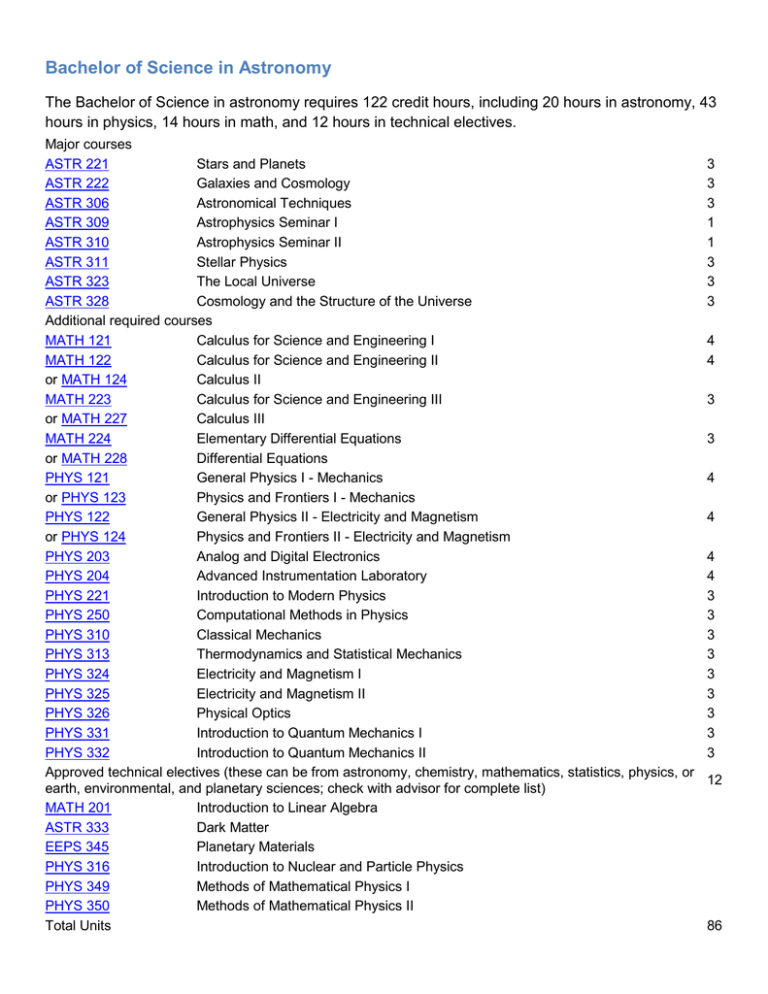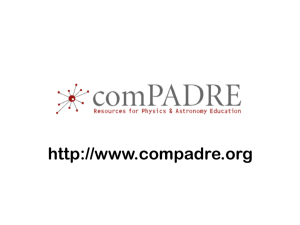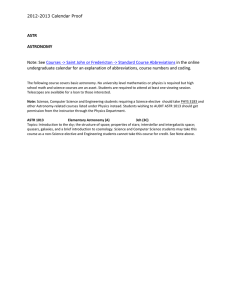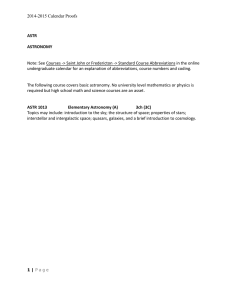Bachelor of Science in Astronomy
advertisement

Bachelor of Science in Astronomy The Bachelor of Science in astronomy requires 122 credit hours, including 20 hours in astronomy, 43 hours in physics, 14 hours in math, and 12 hours in technical electives. Major courses ASTR 221 Stars and Planets ASTR 222 Galaxies and Cosmology ASTR 306 Astronomical Techniques ASTR 309 Astrophysics Seminar I ASTR 310 Astrophysics Seminar II ASTR 311 Stellar Physics ASTR 323 The Local Universe ASTR 328 Cosmology and the Structure of the Universe Additional required courses MATH 121 Calculus for Science and Engineering I MATH 122 Calculus for Science and Engineering II or MATH 124 Calculus II MATH 223 Calculus for Science and Engineering III or MATH 227 Calculus III MATH 224 Elementary Differential Equations or MATH 228 Differential Equations PHYS 121 General Physics I - Mechanics or PHYS 123 Physics and Frontiers I - Mechanics PHYS 122 General Physics II - Electricity and Magnetism or PHYS 124 Physics and Frontiers II - Electricity and Magnetism PHYS 203 Analog and Digital Electronics PHYS 204 Advanced Instrumentation Laboratory PHYS 221 Introduction to Modern Physics PHYS 250 Computational Methods in Physics PHYS 310 Classical Mechanics PHYS 313 Thermodynamics and Statistical Mechanics PHYS 324 Electricity and Magnetism I PHYS 325 Electricity and Magnetism II PHYS 326 Physical Optics PHYS 331 Introduction to Quantum Mechanics I PHYS 332 Introduction to Quantum Mechanics II Approved technical electives (these can be from astronomy, chemistry, mathematics, statistics, physics, or earth, environmental, and planetary sciences; check with advisor for complete list) MATH 201 Introduction to Linear Algebra ASTR 333 Dark Matter EEPS 345 Planetary Materials PHYS 316 Introduction to Nuclear and Particle Physics PHYS 349 Methods of Mathematical Physics I PHYS 350 Methods of Mathematical Physics II Total Units 3 3 3 1 1 3 3 3 4 4 3 3 4 4 4 4 3 3 3 3 3 3 3 3 3 12 86 Six hours of mathematics and natural science (physics) also count towards the SAGES breadth requirements, and one required math course also count towards the SAGES Quantitative Reasoning requirement. Sample Plan of Study: Bachelor of Science in Astronomy First Year Units Fall Spring 4 4 0 4 3 Calculus for Science and Engineering I (MATH 121) General Physics I - Mechanics (PHYS 121)a PHED (2 half semester courses) SAGES First Seminar Social Science I Calculus for Science and Engineering II (MATH 122) or Calculus II (MATH 124) General Physics II - Electricity and Magnetism (PHYS 122) PHED (2 half semester courses) Elementary Computer Programming (ENGR 131) Doing Astronomy (ASTR 151)* Arts & Humanities I Year Total: 15 Second Year Stars and Planets (ASTR 221) Calculus for Science and Engineering III (MATH 223) or Calculus III (MATH 227) Introduction to Modern Physics (PHYS 221)a Analog and Digital Electronics (PHYS 203) SAGES University Seminar Galaxies and Cosmology (ASTR 222) Elementary Differential Equations (MATH 224) or Differential Equations (MATH 228) Advanced Instrumentation Laboratory (PHYS 204) Computational Methods in Physics (PHYS 250) Classical Mechanics (PHYS 310) SAGES University Seminar Year Total: Third Year Stellar Physics (ASTR 311)b Thermodynamics and Statistical Mechanics (PHYS 313) Technical Elective Arts & Humanities II Social Science II 4 4 0 3 1 3 15 Units Fall Spring 3 3 3 4 3 3 3 16 4 3 3 3 19 Units Fall Spring 3 3 3 3 3 Cosmology and the Structure of the Universe (ASTR 328)b Electricity and Magnetism I (PHYS 324) Physical Optics (PHYS 326) Quantitative Reasoning Technical Elective Year Total: 15 Fourth Year Astronomical Techniques (ASTR 306)b Astrophysics Seminar I (ASTR 309) Electricity and Magnetism II (PHYS 325) Introduction to Quantum Mechanics I (PHYS 331) Astronomy Capstone Project (ASTR 351)c The Local Universe (ASTR 323)b Technical Elective Global and Cultural Diversity Astrophysics Seminar II (ASTR 310) The Local Universe (ASTR 323)b Introduction to Quantum Mechanics II (PHYS 332) Astronomy Capstone Project (ASTR 351)c Social Science II Dark Matter (ASTR 333)b Technical Elective Year Total: Total Units in Sequence: 3 3 3 3 3 15 Units Fall Spring 3 1 3 3 1-3 3 3 3 1 3 3 1-3 3 3 3 17-19 14-16 126-130 a Selected students may be invited to take PHYS 123 Physics and Frontiers I - Mechanics, PHYS 124 Physics and Frontiers II - Electricity and Magnetism, in place of PHYS 121 General Physics I Mechanics, PHYS 122 General Physics II - Electricity and Magnetism. b ASTR 306 Astronomical Techniques, ASTR 311 Stellar Physics, ASTR 323 The Local Universe, ASTR 328 Cosmology and the Structure of the Universe and ASTR 333 Dark Matter are taught every other year only. c A SAGES Capstone Experience is required of all students. The BS does not require the astronomy capstone but only that a capstone be taken. The number of hours shown assumes the astronomy capstone with 1 hour in the senior fall semester and 3 hours in the senior spring semester. If another capstone is taken, the number of hours may be different. * Suggested, but not required for the major


